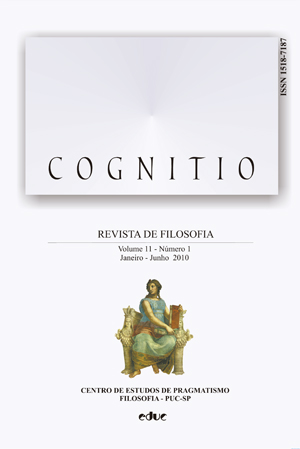Afinidades Eletivas Metafísicas: A “História Natural do Intelecto” de Emerson e o Sinequismo de Peirce
Palavras-chave:
Abdução. Conaturalidade, ou afi nidade de mente e natureza. Crítica do nominalismo. Generalidades de pensamento. História natural do intelecto, de Emerson. Idealismo objetivo evolucionário. Identidade e metamorfose.Imaginação como base da descoberta poétiResumo
O ensaio propõe que o sistema metafísico de Peirce em sua última fase foi consequência das ideias fi losóficas básicas de Emerson, elaboradas mais de quatro décadas antes. Peirce, com seu brilho característico, transformou as ideias luminosas de Emerson em elaborações categoriais de abdução,sinequismo cosmogônico, semiose universal e assim por diante. Para ilustrar esse processo de transformação, o ensaio apresenta uma sinopse contínua do último escrito signifi cativo de Emerson, “The Natural History of Intellect” (1870), que originalmente fez parte de uma série de palestras de equipe em Harvard que Emerson dividiu com seis outros, um dos quais o jovem C.S.Peirce. A sinopse demonstra que praticamente todas as principais doutrinas metafísicas de Peirce tiveram seu precedente em Emerson. Entre as várias referências, Peirce reconheceu a influência de Emerson (juntamente com a de Schelling) em seu ensaio de 1892, “The Law of Mind”. Mesmo antes disso, ele citou o poema de Emerson “The Sphinx” em seu “A Guess at the Riddle” de 1887-88, o momento decisivo da carreira de Peirce em direção à especulação metafísica. Sua recepção consciente da filosofia e poesia de Emerson é oriunda de muitas fontes (inclusive da longa amizade de Emerson com seu pai, Benjamin Peirce). A afinidade eletiva entre sua visão e a de Emerson nos permite perceber que os dois autores forjaram uma linha central de pensamento metafísico ideal-realístico que modelou os pragmatismos posteriores de James e Dewey, entre outros.Métricas
Carregando Métricas ...
Downloads
Publicado
2013-01-22
Como Citar
Dilworth, D. A. (2013). Afinidades Eletivas Metafísicas: A “História Natural do Intelecto” de Emerson e o Sinequismo de Peirce. Cognitio: Revista De Filosofia, 11(1), 22–47. Recuperado de https://revistas.pucsp.br/index.php/cognitiofilosofia/article/view/13375
Edição
Seção
Artigos Cognitio









